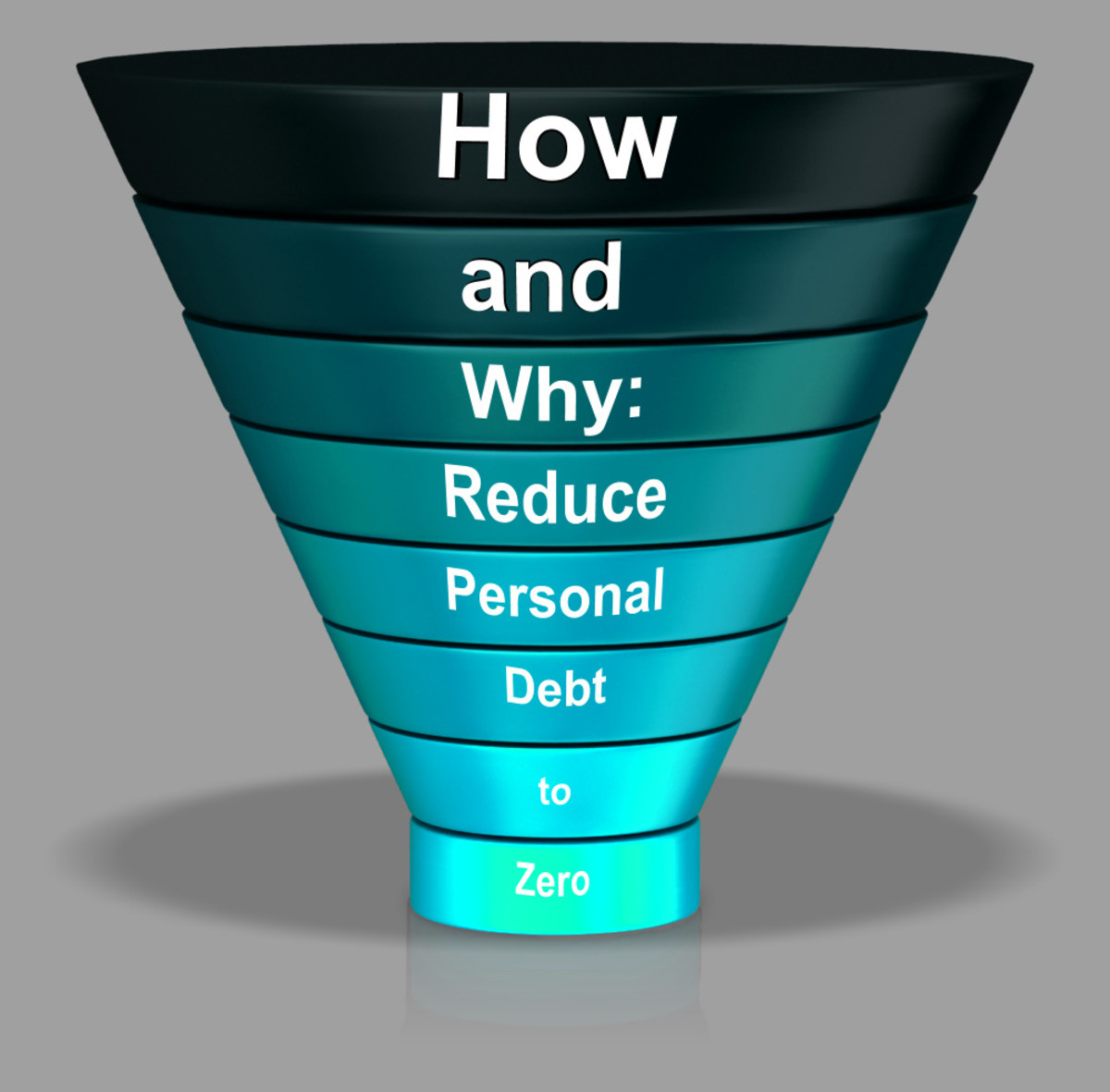How We Got Financial Help with Our Medical Bills
Learn to Play by Their Rules or You'll Pay... by Their Rules
I am writing this in hopes of helping others who find themselves over their heads in debt with medical bills. At the very least I want to get the word out that there are often ways of getting medical bills lowered and sometimes even completely paid off, without declaring bankruptcy.
There are bill advocates who can help you get your medical bills lowered.
However, for a very specific reason I chose to do all of my own research in order to get help with our medical bill situation, and that is because I believed that I would work harder for us than anyone else would, since we had so much at stake. Now it is my hope that all of my hard work will benefit others in similar situations. If (like I did) you wish to take matters into your own hands, I believe that my hours and hours and hours of research can help you a lot, in the very least I will leave with you excellent places to find information, and stories of inspiration. In the case of medical bills, ignorance is not bliss, but knowledge is power.
First I will give you the account of what happened when my husband had surgery and the bills we would receive were traumatic, overwhelming, devastating. I will then tell what I have learned: from other people (who have experienced the difficulties of navigating the medical field) and from different web sites I came across in my search. In this telling I believe I’m divulging a well kept secret of which many people within the medical industry are unaware.
Here’s our (J’s) story.
Last year in March of 2009 my husband J had hip revision surgery in a (non-profit) hospital in San Diego that I’ll refer to as J’s hospital (I don’t believe that it is important to name the hospital since I learned that their practices are unfortunately not unique, but rather common, at the same time the surgery was a complete success, and the doctor and his assistants did a stand up job). Just to clarify, hip revision surgery is different from hip replacement surgery in that the hip being replaced is already a prosthetic hip, which is being replaced.
Before the surgery, J went to the hospital for a scheduled pre-op day, which consisted of J meeting with different people at the hospital to make sure he was ready for surgery, physically and financially. Consequently one of the people he met with was a woman in the finance department of the hospital. She was in charge of making sure that they (the hospital) have the correct billing address for J and for telling him how much his insurance would cover (it capped at $26,000). J then asked how much they normally charge for a hip revision surgery, and she said she didn’t know. When he then asked how much they charge for an overnight stay at their hospital (he would stay three nights) she said she didn’t know that either and, “We’ll work with you,” to which he told her that he wanted the cheapest room possible.
When he got home that same day he phoned his insurance agent and told him about the surgery and asked if he thought $26,000 would cover it. He said from his experience, he thought it would be close. We had also done quite a bit of research beforehand and found that most people paid between $12,000 and $28,000 for this specific surgery in our area (San Diego). This is important because we had also learned that one could go, for example, to India (to an internationally accredited hospital) for less than $6,000. This price was very specific about what the “package” includes, which as we’ve learned is a huge difference from the way our local hospitals operate (so to speak). The prices vary in the states also, more than we could believe. Virginia or West Virginia was leading the pack of being the least expensive back then.
At any rate (pun) we figured we would be able to afford this surgery here at home in San Diego, even if the worst-case scenario occurred and the cost was up around $28,000.
J had the surgery and it went wonderfully. For three days I visited him in his private hospital room while physical therapists dropped by for ten minutes each day to help him get back on his feet, and nurses gave him his much needed pain killers.
Then J came home to continue his rehabilitation. A couple of weeks after the surgery we started to receive mail from J’s insurance company’s claims department. On these statements it said, “explanation of benefits,” followed by, “This is not a bill.” Most of everything on them is written in code, except the total charge for said procedure, the PPO discount and the amount not covered, which is the amount J owed, “Patient Liability,” and it slowly added up while we waited for the bill.
In April (2009) we received the doozy of all statements, which read Patient Liability = $35,689. From the other room I heard J loudly proclaim, “What???” with dread in his voice. When I read the statement and then looked at J who now had desperation in his eyes my heart sank. You can imagine the hopeless feelings we had and the frightening thoughts that ensued.
We hadn’t seen a bill yet, so we didn’t know how much the total due would actually be. What we did know, so far, was that J was liable (patient liability) for over $40,000. That is, after his insurance company’s discounts of $20,700 and after his insurance had paid out the $26,000 cap (and they did). Apparently the hospital was, so far, charging J well over $90,000 for his hip revision surgery. We didn’t know what to make of it all yet, and out of sheer desperation J got on the phone to the billing department of the hospital to ask them if he was being charged extra for a private hospital room, and they said no.
That is the beginning of many late nights of research and looking into the mysterious and confusing world of medical billing. Each night I went to bed with a bit more hope as I read story after story about others who had been through the same frustrations. Every day I told our story to friends and family asking if they or anyone they knew had any insight or guidance for us.
The anecdotes I heard.
First I must tell you, it is important to not give up hope. One of the first people with whom I spoke works in the medical field, and she told me a story of a friend of hers who works in a hospital and who’s husband had a heart attack. Their medical bill was a whopping $100,000, which they couldn’t afford to pay. This girl works at a hospital and she couldn’t get any aid or reduction of her bill, so they declared bankruptcy. My friend told me that "that’s just the way it is," and I am here to tell you that that is not true! Don’t give up! Even when you hear these kinds of stories from people who you believe would know what’s going on (and often work within the medical field). Like I mentioned, the things one can do to lower their bills, are a very well kept secret.
I also spoke with a really good friend who knows a lot about a lot of things, in hopes that he would have some guidance for us, but he only said that he knew of someone who also had such a huge medical bill that they were forced to declare bankruptcy. I reiterate, don’t give up, when you hear this kind of info it’s important to keep on looking. Just because some people don’t know the answers, doesn’t mean there aren’t any answers out there.
I kept on asking and what I started hearing, began to give me hope. One of my friends had been to the hospital emergency room for a total of 10 hours (eight of which she spent in the waiting room), for which she was billed around $10,000. She phoned a friend of hers who is the leading surgeon of a different major hospital and he told her that when she gets her bill(s), she should call the billing department of the hospital and ask them how much Medicare would pay for each item. Through that process, and telling them that she is a single mom and can’t possibly pay $10,000 she got her bill lowered to $1,700. My brother told me about a friend who got a huge medical bill, called the billing department and got it lowered to a manageable amount, for him.
THE RESEARCH CONTINUES ON-LINE
While we still hadn’t received our actual bills (and a final total), I was learning that at the very least we would probably be able to get it lowered, maybe even by 70%, and that was a huge relief. I found many web sites that helped me to form a game plan to lower our bills. MSN's "How To Survive Your Hospital Bills" (published 3/19/2007), states that the very first step to getting our bill reduced is to get an itemized copy of J’s bill, a copy of his medical chart, and copy of his pharmacy ledger. We needed all of these in order to compare the itemized bill to the medical chart and pharmacy ledger to see if we received everything for which we were being charged. At this time every state required hospitals to provide itemized bills.
We ordered copies of J’s itemized hospital bill, and that took three tries for the billing department to get right. They kept sending partial bills. When it came to the bill, the only thing that was clear, was that the billing department wasn’t interested in making anything easier for us. Trying to make sense of that bill, which is written in a code more difficult to read than Latin, was a new challenge in itself.
I think it is crucial that you read many (at least 20) different sites with this kind of information, because I found different tidbits from different articles that helped our specific situation (i.e. hip revision, location, important wording with which to arm oneself when requesting aid, and not least of all comfort in knowing that we weren’t alone in this nightmare, and the HOPE that we had a chance of making it all better). I also found conflicting information, so it was very helpful for me to read many different accounts and take lots of notes!
I read many articles in which billing auditors said that more than 90% of hospital bills are either wrong or padded beyond belief. I researched headlines such as: "How common are medical billing errors," and "10 Ways to Avoid Outrageous Hospital Overcharges," and "Consequences of Medical Coding and Billing Errors."
One thing that I learned was that if I didn’t understand my bill (I believe that they don’t want us to), I could call the billing department and have them explain it, and not to accept terms like “lab fees” or “miscellaneous fees.” The articles I read further spelled out that it’s likely that you won’t get satisfaction from the billing department.
It's important that you keep reading when something does not ring true: Consumer reports.org/ What You Can Do suggests you use a credit card to pay your bill as a last option, and when I dug deeper I found in, "How To Survive Your Hospital Bills," under Stand up to heavy-handed tactics, explain that it’s not a good idea to borrow against your home or against your credit cards. There are many things to look out for: Never pay a hospital bill before leaving, even if the hospital tells you it’s required, according to Peter Davidson's article on 10 ways to avoid outrageous hospital overcharges.
I found out that hospitals often charge uninsured people more than the discounted rates that they charge insurance companies (it’s kind of akin to giving the top actors of the year, $85,000 gift baskets at the Oscars) and also that government programs such as Medicaid and Medicare pay the least for the same treatment. I learned, when negotiating down our bill, we should ask the billing department what Medicare would pay for the same procedure, and explain to them that we don’t feel we should have to pay more than other patients for the same procedure. In the New York Times’ awesome article, Bargaining Down Medical Bills there is the actual government website Medicare hospital compare where you can find out what Medicare pays for a specific surgery at a specific hospital. That is a gem! I found out that Medicare patients paid $12,760, for “replacement of hip, knee, ankle or reattachment of thigh, foot or ankle” at the same hospital as J at that same time.
Two and a half months after J’s hip surgery we finally received a bill! Not the bill, just one bill from the clinic (a building connected to the hospital but apparently they bill separately from the hospital. It’s all extremely confusing.) I now realized that the bills were going to start pouring in just like the claims statements that were still arriving regularly. This bill was for a doctor’s office visit (before the surgery) which J’s insurance does not cover, for $103. Well it was time to put some of our new information to good use, and start to try to begin trimming these bills down. J got on the phone to the billing department (of the clinic) and first he asked for explanations about each item on it, then he asked how much Medicare would pay for this same service. {I think it’s important to point out the wording here, if you ask the billing department, “How much do you charge Medicare?” they will probably say, “We charge everyone the same.” I don’t know what’s true, but in Bottomlinesecrets Home of America's Leading Experts on Everything!; Making Medical Paperwork Easier, under What’s “Fair and Reasonable” Johnson says that a hospital basically charges the same rates to all patients, but not everyone has to pay the same amount due to negotiating.} So J asked, “How much would Medicare pay for the same service?” (It’s such a game, but if you don’t learn how to play by their rules, then you pay by their rules). The person at the billing department muttered that they don’t (which I translate to, “I’m not going to tell you that.”) But a very interesting thing happened now, quickly the person told J that if he paid the bill before the next billing statement, she could take 40% off of this bill, right now. AMAZING don’t you think so??? So we paid the $61.80 over the phone with a credit card lest she change her mind. That still baffles me. Why not bill us for $61.80 in the first place? Of course I wonder how much more we could have lowered that bill if we knew even more of their secret lingo, but for now we were satisfied. And our new game plan would be to look for discrepancies on each of the many, many, many bills to come, including gross overcharging i.e. $57 when the real cost is .61 cents (read the BottomLineSecrets site again for example) and then we would ask how much Medicare pays for the rest.
One of the best sources I came across for information on healthcare pricing is the Healthcare Blue Book. It is an excellent source for everything healthcare, and I recommend that anyone needing medical care take time to explore this great site. I used it to find out how much a hip revision should cost in our area (entered by zip code). The price quoted in 2009 was $26,538 and today (Nov/2010) it is amazingly down to $21,0198. Unlike J’s hospital billing department, which does not clarify anything, the Blue Book separates the prices into categories of Physician Service, Hospital Service and Anesthesia Service, which is also very helpful, whether you’re shopping for physicians and such, or attempting to compare prices to your itemized bill.
Even with all of the knowledge I had thus far, I felt a need to keep on looking (I have a tendency to over think things) and one especially fortuitous night I found another fantastic site, it is a California Government site, oshpd which stands for Office of Statewide Health Planning and Development. As of 2022 it is called the Department of Health Care Access and information HCAi. Not only did this site contain a myriad of helpful medical information, the people who work there went above and beyond to help me. It made me feel like the government wanted to help me in this dire situation. The oshpd is now called While exploring the oshpd I learned about the CDM (charge description master) or CHARGEMASTER, a document that contains the prices of all of the hospitals goods, services and procedures. According to the oshpd Payers’ Bill of Rights, this chargemaster is to be made available to us in a number of ways. But when I tried to access it on the website of J’s hospital, I couldn’t. First I went to oshpd chargemaster search to see if I could get a look at J’s hospital’s chargemaster in that way. You guessed it, nope. So I phoned the good people at oshpd and they overnighted me a disc with the hospital’s chargemaster. That was amazing. I spent hours and hours comparing J’s confusing itemized bill (which we still only had parts of) with their chargemaster (you have no idea how many times I wanted to bill the hospital/at their exorbitant rate for all of my time spent on this ordeal). There were many discrepancies, and some items didn’t appear at all on their chargemaster, so I felt we had a decent chance of getting J’s bill lowered quite a bit. I was collecting all of the information I could find, like a small arsenal, in order to help us fight for our cause, and so I continued to research…
In many of the previous articles I read that most hospitals have some kind of financial aid or charity program, and though California law requires that they share this information with their patients, I also read that hospitals aren’t fond of letting out that information. J’s hospital certainly never told us about any kind of financial aid, and since I didn’t trust that I would get much help from the billing department (as it wasn’t in their best interest to give us financial aid) and because they were so helpful before, I once again looked to, oshpd and found a great search engine "oshpd fair pricing" used for finding a specific hospital’s fair pricing information.
Through oshpd’s search engine I went to the hospital’s website in order to download their policy file, I clicked on their file and nothing happened. Big surprise! Once again I phoned the person at oshpd and explained my dilemma. Within minutes, that person emailed me the hospital’s fair pricing policy. What a wonderful help they have been! The minute I opened that email and downloaded J’s hospital’s policy, I went straight to a printer, and made copies. This is important because, less than one week later, I could not open that policy again. Call me a conspiracy theorist, but I have no doubt that that hospital has quite some kind of security software (or whatever you call it), which was able to keep my prying eyes from seeing their fair pricing policy again.
The policy title is: “Patient Accounts, Financial Assistance, including Charity Care, Hospital Services.” This now became our immediate priority, before we would talk with the billing department about shaving chunks off of the bills (which we hadn’t received any more of yet). We would apply for financial assistance. J called the billing department and told them our plan; they sent us an application as well as telling us that along with the completed application, we must send the last two years of all of our tax statements/information, since we were self employed (if we worked for someone else, the last two months pay stubs), also the last two months of all of our bank statements (checking, savings, etc). Along with the paperwork we had to submit a “letter of hardship” explaining why we need aid.
On the oshpd website it stated that you may be eligible for free or discounted hospital care if you’re uninsured, underinsured (bingo) or have high healthcare costs (that’s another hit). It states that (with some exceptions) in order to qualify for the discounted or free care your income must be below 350% of the federal poverty level (FPL) AND you do not have health insurance of any kind, or you have health insurance or coverage, but your medical costs are more than 10% of your families income in the last year (JACKPOT).
Policies differ, and J’s hospital’s policy on charity care was over six pages long and written in more legal code (every step of this huge bill frustration was daunting) but in essence it stated that we must earn less than 200% of FPL and our out-of-pocket medical expenses exceed 10% of the patient’s family income in the prior 12 months in order to qualify. Since J’s (our) out of pocket medical expenses so far were over $40,000, we knew we easily (unfortunately) qualified for the second half of that policy. As for whether or not we earned less than 200% of the FPL, well we didn’t know which numbers they would consider when determining our earnings: gross, net or somewhere in between.
When writing our letter of hardship, I wanted to use jargon that the hospital would understand and accept. I gathered great vocabulary and I used words and terms that I discovered in articles and advertisements by different medical advocates and lawyers. In "Bottom Line Secrets, Making Medical Paperwork Easier," I realized that “fair and reasonable” are words some billing advocates use, therefor, so did I. I discovered a couple of sites with class action lawsuits against J’s hospital for overcharging uninsured patients (quelle surprise). I learned that the lawyers used terms like, unreasonable, unconscionable, and excessive hospital bills. Now I would much rather go to the dentist’s office for a cleaning than read legal reports, talk about dry, but I believe there is some important information to be had in such places. I used the words “usual and customary” prices, as I read in an article by "Hospital Bill Review."
In the hardship letter I recalled the fact that J had asked for the cheapest room, and he had asked how much the hospital charges for a hip revision, and for room and board for one night, while the woman in the financial department wouldn’t tell him. I inquired how the hospital could charge us over $40,000 (after insurance paid $26,000 and discounted another $20,700), while Medicare only paid $12,760 for a hip replacement at that same time. I detailed our financial situation thoroughly. Lastly I reminded the hospital that the $40,000 patient liability is (unfortunately) much higher than 10% of our income, and would create quite a hardship for us to pay. We sent off the required information to the billing department and waited with fingers and toes crossed. We read that it could take six weeks to get an answer.
Well, I mentioned earlier that the woman in the financial department said, “We’ll work with you.” When it comes to the outcome of our hospital bills, better words have not been spoken. In less than one week (not six weeks) we got a letter that more than answered our prayers. We received 100% Charity Care, which is to say the amount we owed the hospital, clinic and so forth was adjusted to zero dollars.
The good news is that we qualified for full Charity Care from the hospital, and the bad news is that we were living under 200% of the federal poverty level.
Our story doesn’t end quite yet. According to the financial assistance policy, once J was granted financial assistance, he was granted that assistance for a period of six months. For the next six months J was covered under the Charity Program. This is not something that the billing department or anyone else told us. We knew about the six-month clause because I read every single word of everything I came across during that period. I had to in order to understand what it all meant, and I’m sure glad I did. So here is how that worked. When J went back to his hospital for his post surgery office visits and for a foot condition, he was completely covered under the Charity Program. Interesting yet not at all surprising was that none of the hospital staff with whom J dealt in that time had ever heard of Charity Care.
The tale continues as the bills did start to arrive from all directions; doctors, clinic, hospital, anesthesiologist and lab. The way it works with financial aid is that every time we received a bill, J had to call the billing departments and tell them that we were granted full Charity Care. Sometimes the billing department would only have to look on their computer and update the records, and sometimes we would have to send them a copy of the Charity Care letter to them. I must point out that most of these people who work in billing were unfamiliar with the existence of their own Charity Program. So you can see how well that secret has been kept.
Of course we were thrilled to get the Charity Care and in an attempt to help “get the word out,” so that more people would know that this financial aid was available to them, I wrote letters to our Congresswomen, Senator, Governor and President telling our story and requested that they find a way to make this aid public knowledge, so that hospitals can’t keep the lid on it anymore. I got some form letters back suggesting I take a look at their healthcare reform sites, along with a lot of political mumbo-jumbo.
The tragedy of this whole story is twofold. First, if we can even get insurance in this country, we pay inflated and unreasonable prices for insufficient coverage. If that weren’t true, J’s very expensive insurance would have covered his medical needs. Instead it was capped, and I believe that is the only reason that we discovered the second tragedy here. That is, as I read in money central/msn, “Profit-hungry hospitals are overcharging consumers an estimated $10 billion a year. Some deliberately work to keep bills indecipherable.” This begs the question, “How often do hospitals get away with highway robbery?” Life is hard enough when we fall ill or need medical attention, we should not ever have the added worry of wondering how we will be able to pay for it. That is wrong on every level!
I want to leave you with a few more sites that might help you if you feel you’ve been wronged by the medical world and you don’t know where to turn. If you want to see if your physician is licensed, has been issued citations, been disciplined or basically been up to no-good, government site - California Medical Board. You can also file a medical complaint with the California Medical Board complaint department. And you can learn more about healthcare fraud on the Anti-Fraud site.
For those of you who would rather have someone else deal with your hospital bills (believe me I understand), there are lots of professional bill advocates/bill negotiators out there who can help you, and there are just as many people with advice on how to choose a bill negotiator. Since I didn’t use a bill advocate, I recommend you read up on that and ask all of the people you know if they have any suggestions. healthcarebluebook Medical Bill Negotiating Services has lots of great advice and urges, among other things, that you choose a service that doesn’t charge any money up front. They have teamed up with medical advocates (at the time of this writing).
If you want information for negotiating prices before you seek medical aid, most of the sites here have a multitude of insight to help you feel like you’re not at the mercy of the crazy billing systems of our medical world. If you need help finding the right doctor for you healthcare 411 is excellent with DocFinder and Question builder tools. I personally might even consider going abroad as I’ve read many excellent stories about medicine in other countries, and there are quite a lot of websites dedicated to this. Look under medical tourism. I mean, is it really such a scary idea to trust doctors and hospitals in other counties? Scarier than all of this? I think not. The best of wishes to you!
This content was accurate and true to the best of the author’s knowledge at the time of publication but may be out of date. The information contained in this article may not reflect current policies, laws, technology, or data.
© 2010 the tenth muse








